|
|
|
Sort Order |
|
|
|
Items / Page
|
|
|
|
|
|
|
| Srl | Item |
| 1 |
ID:
124323
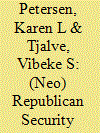

|
|
|
|
|
| Publication |
2013.
|
| Summary/Abstract |
Written from a vantage point in between Security Studies, Political Theory, and Governance Studies, this article attempts to theorize the current mobilization of civil society for the purposes of "national security," "risk precaution," or "homeland resilience" as the emergence of a neo-republican form of security governance-a mode of governance more reliant on organicist means of social construction than on economic or individualist instruments of social control. We argue that if the discipline of International Relations (IR) wishes to understand the nature of this emerging security order, it needs to assume a more cross-disciplinary approach and to develop a much richer idea of republicanism as not only a political philosophy but also a practice of governance.
|
|
|
|
|
|
|
|
|
|
|
|
|
|
|
|
| 2 |
ID:
138088
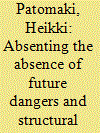

|
|
|
|
|
| Summary/Abstract |
One of the great appeals of securitization theory, and a major reason for its success, has been its usefulness as a tool for empirical research: an analytic framework capable of practical application. However, the development of securitization has raised several criticisms, the most important of which concern the nature of securitization theory. In fact, the appropriate methods, the research puzzles and type of evidence accepted all derive to a great extent from the kind of theory scholars bequeath their faith to. This Forum addresses the following questions: What type of theory (if any) is securitization? How many kinds of theories of securitization do we have? How can the differences between theories of securitization be drawn? What is the status of exceptionalism within securitization theories, and what difference does it make to their understandings of the relationship between security and politics? Finally, if securitization commands that leaders act now before it is too late, what status has temporality therein? Is temporality enabling securitization to absorb risk analysis or does it expose its inherent theoretical limits?
|
|
|
|
|
|
|
|
|
|
|
|
|
|
|
|
| 3 |
ID:
090960


|
|
|
|
|
| Publication |
2009.
|
| Summary/Abstract |
The objective of this literature review is to understand where Graphical Information Systems (GIS) can be useful to address security issues and how it has been used until now. While the geographic drivers of territorial conflicts have been extensively described by a number of political studies, the quantitative analysis of these drivers is quite new. This study traces an evolution from conceptual research to quantitative development. It then discusses the advantages and challenges of applying new geographic techniques to analyze spatial drivers of conflict. We identify the main spatial components in conflict and security, the existing types of information/data and the quantitative methods used. We describe the spatial component of security by looking at: (i) the main sociopolitical concepts linked to territory, (ii) the kind of geographic concepts linked to territory, (iii) measures used to describe such geographic concepts; and (iv) the issues raised in any attempt to integrate geographic concepts into a GIS. We conclude that GIS tools can be useful in the analysis of civil disputes, particularly where subnational level data exists. This paper shows that spatial processing tools in GIS allow us to represent some spatial components and to address new issues such as the fuzzy complexity of border permeability.
|
|
|
|
|
|
|
|
|
|
|
|
|
|
|
|
| 4 |
ID:
122908
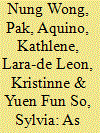

|
|
|
|
|
| Publication |
2013.
|
| Summary/Abstract |
In recent years, transnational Chinese investors from the Greater China region have been seeking natural and mineral resources in foreign countries. This paper focuses on a mineral-rich region in the Philippines where China's resource-led diplomacy was first launched in 2007. Although foreign Chinese mining companies have made inroads into mineral-rich local communities, they have also encountered resistance from non-state actors, causing their operations to be disrupted and suspended. The authors argue that the local reception of China's resource-led diplomacy can be attributed to two factors. First, in light of the debate on 'China's globalization versus South East Asian state sovereignty', the growing strength of the Philippine state in resisting transnational mining endeavours hinges on the democratic space constituted by both state and non-state actors, resulting from political decentralization and active social activism. Second, it shows that the transnational Chinese actors have an insufficient knowledge base, in which they privilege a top-down state-centric approach that reinforces the patrimonial rule of the Philippine politicians. The authors conclude, first, that such patrimonial rule is largely made possible through the provincial governor as the key agent connecting the national state authority, local government units, mining operators/investors and the affected villagers. Second, local resistance to resource-led patrimonial rule hinges on the formation of Philippine democratic space. This space remains transient and unpredictable in nature, and so cannot be assimilated into the patrimonial character of the Philippine state. Such democratic struggle is like wind, thunder and lightning - hard to chase, hard to catch.
|
|
|
|
|
|
|
|
|
|
|
|
|
|
|
|
| 5 |
ID:
171965
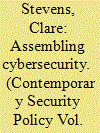

|
|
|
|
|
| Summary/Abstract |
This is an article about how cybersecurity gets “made,” with a focus on the role of commercial computer security firms in generating knowledge in matters of international cybersecurity. The argument is two-fold. Firstly, malware may be an intangible artefact in some ways, but its success and its interpretation as malware is deeply interwoven in social, technical, and material alliances. Secondly, a materialist-minded examination of Symantec’s Stuxnet reports will demonstrate the politically situated nature of how cybersecurity expertise emerges. The article finds that Symantec’s work was not a-political or neutrally-technical: Their experts made profoundly political choices in their analyses. By showing the processes that go into making cybersecurity, the article contributes to a widening and deepening of debates about what is at stake in cybersecurity knowledge and practices.
|
|
|
|
|
|
|
|
|
|
|
|
|
|
|
|
| 6 |
ID:
050842
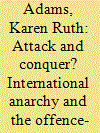

|
|
|
|
|
| Publication |
Winter 2003-04.
|
|
|
|
|
|
|
|
|
|
|
|
|
|
|
|
| 7 |
ID:
106195
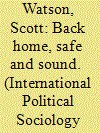

|
|
|
|
|
| Publication |
2011.
|
| Summary/Abstract |
Challenging the representations of the securitization of migration and disease as a productive broadening of security studies or as a troubling shift associated with recent developments in international politics, this article explores how the regulation of human movement and contagious disease functions to reproduce the international/domestic foundation of the nation-state system and to support the moral basis of exclusion from individual states. Drawing on the practices of border and health regulation in Canada, and specifically through the technology of insurance, the article explores how health and immigration bureaucracies and private insurance corporations reproduce the international realm as anarchic, disordered, and dangerous through the representation of certain regions and peoples as unhealthy, irrational, and dangerous.
|
|
|
|
|
|
|
|
|
|
|
|
|
|
|
|
| 8 |
ID:
171986
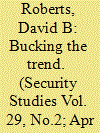

|
|
|
|
|
| Summary/Abstract |
The literature examining national militaries in the Arab world paints a near-universally bleak picture of their capabilities. Some argue issues rooted in “Arab culture”—so-called essentialist rationales—fatally undermine military effectiveness. Others assert that regime security concerns encourage leaders to actively politicize, coup-proof, and consequently weaken their military. This article challenges these literatures by demonstrating that United Arab Emirates (UAE) forces have repeatedly exemplified unusual levels of military effectiveness and sophistication in hostile campaigns. Using approaches from public policy studies (the Advocacy Coalition Framework), this paper investigates how the UAE military bucked the trend. The 1990 invasion of Kuwait was a “focusing event” that prompted a rethink of existing approaches. Catalyzed, a key “policy entrepreneur,” Abu Dhabi Crown Prince Mohammed bin Zayed Al-Nahyan, changed approaches to training, unified federal militaries, and tested forces in challenging operations. Such findings undercut lingering essentialist critiques of Arab militaries, provide a potential pathway for other states to emulate, demonstrate that secure and motivated leaders can overcome coup-proofing concerns, and showcase the fruitful pollination of methodologies from public policy to security studies.
|
|
|
|
|
|
|
|
|
|
|
|
|
|
|
|
| 9 |
ID:
161268
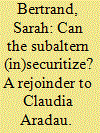

|
|
|
| 10 |
ID:
084060
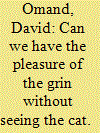

|
|
|
| 11 |
ID:
095439
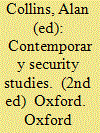

|
|
|
|
|
| Edition |
2nd ed
|
| Publication |
Oxford, Oxford University Press, 2010.
|
| Description |
xxxi, 542 p.
|
| Standard Number |
9780199548859, pbk
|
|
|
|
|
|
|
|
|
|
|
|
Copies: C:1/I:0,R:0,Q:0
Circulation
| Accession# | Call# | Current Location | Status | Policy | Location |
| 054885 | 355.033/COL 054885 | Main | On Shelf | General | |
|
|
|
|
| 12 |
ID:
141968
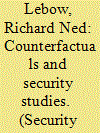

|
|
|
|
|
| Summary/Abstract |
Cause is a cognitive shorthand, not a feature of the world. Context is almost invariably critical in shaping outcomes. For both these reasons, correlations in international relations are weak and all but useless for purposes of explanation and prediction. I develop “inefficient causation” as an alternative approach to explanation and forecasting. It divides the causal problem into two components: reasons actors have for behaving as they do, and the aggregation of the behavior of multiple actors. Both make use of comparative and counterfactual analysis.
|
|
|
|
|
|
|
|
|
|
|
|
|
|
|
|
| 13 |
ID:
102461
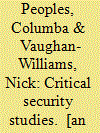

|
|
|
|
|
| Publication |
London, Routeldge, 2010.
|
| Description |
vii, 182p.
|
| Standard Number |
9780415484442
|
|
|
|
|
|
|
|
|
|
|
|
Copies: C:1/I:0,R:0,Q:0
Circulation
| Accession# | Call# | Current Location | Status | Policy | Location |
| 055853 | 355.033/PEO 055853 | Main | On Shelf | General | |
|
|
|
|
| 14 |
ID:
171960
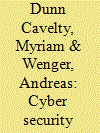

|
|
|
|
|
| Summary/Abstract |
In the last decade, cyber incidents have become more expensive, more disruptive, and in many cases more political, with a new body of theoretically informed research emerging in parallel. This article provides the intellectual history to situate this literature in its broader evolutionary context. After identifying and discussing six drivers from the fields of technology, politics, and science that have been influential in the evolution of cyber security politics and how it is studied, we describe three historically contingent clusters of research. Using the same driving factors to look into the future of research on cyber security politics, we conclude that it is a vibrant and diverse biotope that is benefitting from its interdisciplinarity, its relevance for policy, and its cognizance of the interplay between technological possibilities and political choices of state actors.
|
|
|
|
|
|
|
|
|
|
|
|
|
|
|
|
| 15 |
ID:
147381
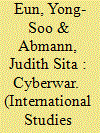

|
|
|
|
|
| Summary/Abstract |
This article examines the implications of cyberwar for national security and traditional warfare. While not making traditional war obsolete, cyber-weapons can nonetheless be force-amplifiers for kinetic attacks in future wars. Not only are cyber-weapons easier to deploy, they can also be activated much more cheaply than conventional weapons. This cost–benefit ratio levels the playing field, especially to the benefit of Third World countries which lack considerable leverage in terms of exercising traditional military power. By bringing new aspects to the theater of war, cyberwar asks us to revamp our policy and study of security, war, and power. Although it does not change the very nature of warfare which remains political, instrumental, and violent, cyberwarfare will reshape the ways in which war begins or is carried out in the near future. Our analytical and theoretical understanding of the international politics of the digital age can be enriched by taking what is happening in cyberspace more seriously.
|
|
|
|
|
|
|
|
|
|
|
|
|
|
|
|
| 16 |
ID:
121821
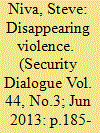

|
|
|
|
|
| Publication |
2013.
|
| Summary/Abstract |
In the twilight of the USA's ground wars in Iraq and Afghanistan, there has been an expanding shadow war of targeted killings and drone strikes outside conventional war zones, where violence is largely disappeared from media coverage and political accountability. While many attribute the growth in these shadowy operations to the use of new technologies and platforms such as drones, this article argues that the central transformation enabling these operations is the increasing emergence of network forms of organization within and across the US military and related agencies after 2001. Drawing upon evidence from unclassified reports, academic studies, and the work of investigative journalists, this article will show that elements within the US military and related agencies developed in the decade after 2001 a form of shadow warfare in which hybrid blends of hierarchies and networks combine through common information and self-synchronization to mount strike operations across transnational battle spaces. But, rather than a top-down transformation towards networks, this article will show how it was the evolution of the Joint Special Operations Command (JSOC) from an elite strike force into a largely autonomous networked command that has been central to this process. Although drone strikes have received the bulk of critical attention in relation to this expanding shadow war of targeted killing, this often-lethal networked warfare increasingly resembles a global and possibly permanent policing operation in which targeted operations are used to manage populations and threats in lieu of addressing the social and political problems that produce the threats in the first place.
|
|
|
|
|
|
|
|
|
|
|
|
|
|
|
|
| 17 |
ID:
159416


|
|
|
|
|
| Summary/Abstract |
Scholars in the field of peace and conflict studies have long worried that their discipline is divided – between studies of war and war making, and studies of peace and peacemaking. However, empirical research into the existence, extent, and nature of such a division is scarce. We remedy this by addressing two questions: 1) how is work in the field of peace and conflict studies distributed between its two nominal pillars: “peace” and (violent) “conflict”? and 2) to what extent is there communication and exchange between the two sets of studies? Making use of a unique combination of methods, we find that studies of violence hold a dominant position in the field, although there is also a sizable body of work that explores topics of peace, understood as conflict prevention and/or response. That said, we find limited evidence of intellectual exchange between studies of war/making and peace/making. We also find evidence of gendered, regional, and methodological divides. We argue that such schisms may be preventing scholars of peace and conflict from collectively realizing the founding ontological goal of their discipline, which was to understand the causes of war in order to contribute to an understanding of how conflict can be managed peacefully.
|
|
|
|
|
|
|
|
|
|
|
|
|
|
|
|
| 18 |
ID:
171811


|
|
|
|
|
| Summary/Abstract |
Unlike in the broader field of international relations, relatively little research on gender representation and gendered experiences exists within the subfield of security studies. This article begins to fill that gap by sharing the results of a 2019 survey of members of the International Security Studies Section (ISSS) of the International Studies Association (ISA). The survey results show striking gender differences in members’ experiences, with women more likely than men to describe ISSS as “insular,” “clubby,” and an “Old Boys’ Network”; more likely to report experiences of hostility and exclusion; and more likely to believe that diversity initiatives are needed. Our analysis reveals that women in the ISSS report (1) harassment, (2) negative experiences participating in various section activities, (3) more significant barriers to attending and being selected for the section's ISA program, and (4) a sense of feeling unwelcome at ISSS meetings, all at higher rates than male respondents.
|
|
|
|
|
|
|
|
|
|
|
|
|
|
|
|
| 19 |
ID:
192531
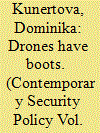

|
|
|
|
|
| Summary/Abstract |
Before Russia’s 2022 invasion of Ukraine, security studies scholars were myopic about small drones’ enabling functions and tactical benefits. They were preoccupied with drone impacts on international security and the ethical dimensions of counterterrorism drone strikes. Similarly, literature on the revolution in military affairs has examined emerging drone technologies based on their strategic advantages. “Low-tech” drone innovations have received less attention. The war has highlighted the collective magnitude of these omissions. At first, scholars followed extant predictions by concluding that large drones did not revolutionize warfare, proliferated slowly, and were too costly and complex to operate. Yet, one year into the war, thousands of drones—scouts, loitering grenades, drone bomblets, and suicide drones—are defying the field’s assumptions of their uselessness sans air superiority. Contrary to most theoretical expectations, small drones in Ukraine are changing battlefield dynamics from lower airspace. Scholars must begin to study drone diversity in modern wars.
|
|
|
|
|
|
|
|
|
|
|
|
|
|
|
|
| 20 |
ID:
165327
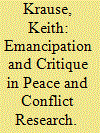

|
|
|
|
|
| Summary/Abstract |
This contribution examines how the critical potential of research on peace in International Relations has been simultaneously marginalized and transformed. It briefly traces the evolution of peace research, as well as choices, contestation, and breaks in the construction (and “disciplining”) of peace and conflict research. It then focuses on two epistemological and normative choices that occlude the emancipatory potential of peace research and marginalize certain approaches to the study of the causes of war and conditions of peace. In a more positive vein, it illustrates, with examples from recent research, where potentially emancipatory or transformative scholarship on building peace has migrated.
|
|
|
|
|
|
|
|
|
|
|
|
|
|
|
|
|
|
|
|
|